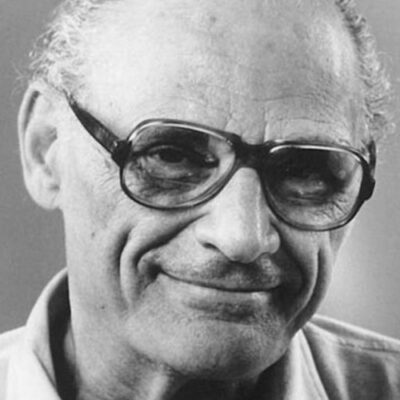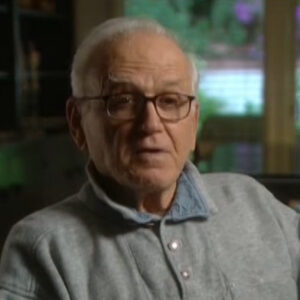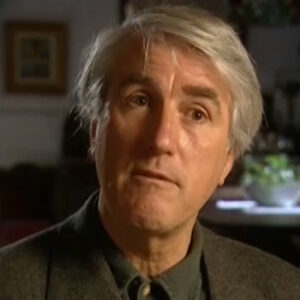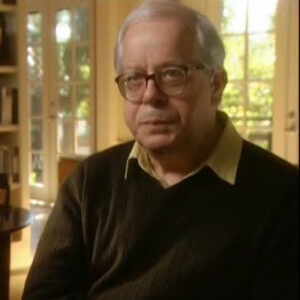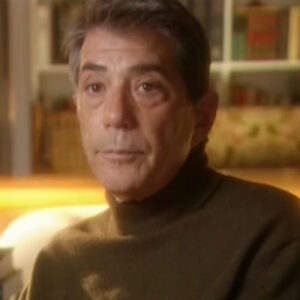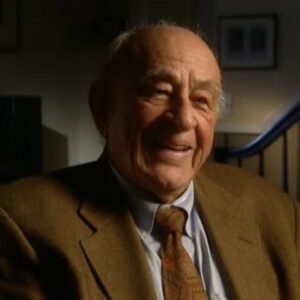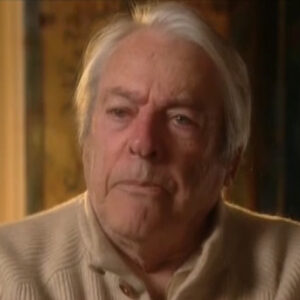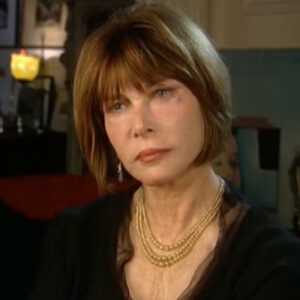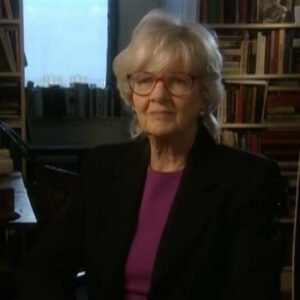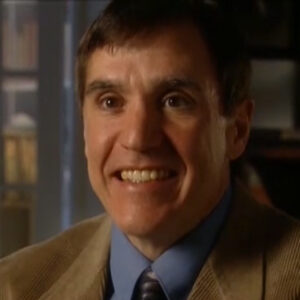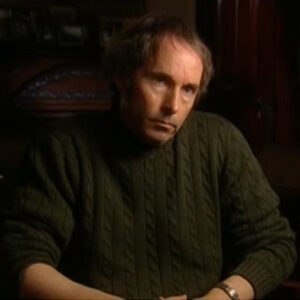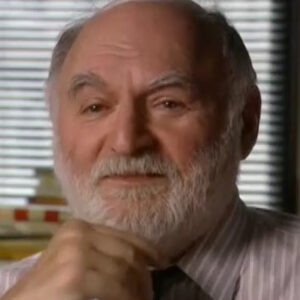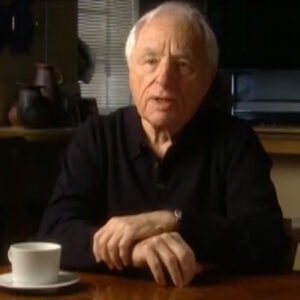Speaker And a play or a screenplay in terms of working. Did he approach the material the way other directors would?
Speaker I mean, you’re very eloquent about talking about how he approached the actor in a unique way. Do you think he personally cereal differently to.
Speaker I don’t know. I think he was. I think he was very personal with the players that he did his relationship to the play. And. He would. He’d certainly had studied it, had decided what sort of production was necessary, what the actress should be should do in order to bring the play alive. Then his. Job was working with the actors to also attain that, but he did it in a very generous way. It was some. He wasn’t. Rigid in terms of what he wanted, you do this, you know you do that. No, it was a little like. Handling, handing the ideas back and forth, he would accept from you, from the actors. Any thoughts or ideas that they had in relation of play. And gradually, if they worked fine, he would accept them and let them stay in. But he certainly never denied you the ability or the reason to to express your opinions, what you feel was necessary in the role. It was a wonderful given take experience with him. But I think kind of all of us knew that the end, whatever we chose to do, it would be his approval or it wouldn’t get chosen.
Speaker You talked with many people who were actors that worked with him.
Speaker It’s kind of like Sixth Sense, this ability to see parts of you that others didn’t see. Parts of the character that maybe you. Emotional intelligence that seems that he’s bringing always to his work. Is that what you experienced?
Speaker I think that’s true. Quite true. He had this. Well.
Speaker To back up his. His need to know what was within the actor that he wanted to bring out. He would get to know the actor well enough to find that out.
Speaker But it was always very private. Which was a very generous way of going at it.
Speaker So that particularly the very personal things that he would grab from you, the buttons that he pressed to get out what he wanted. Oh, you.
Speaker He were the only ones who were. Who really knew?
Speaker I wasn’t sure that they shared that. Yes. OK.
Speaker Oh, yeah. Yes, I know. That’s why you got to share that I can cut, right? Right, for sure. OK.
Speaker People, men, women, I mean, people that worked with him as writers. I mean, Walter Bernstein and Arthur Miller.
Speaker People like yourself, Karl Malden, a whole swath of people that entered his life in very, very different ways.
Speaker All talk about him as being the most seductive person they ever met, that you share that opinion or not. What is it? What? I look at a picture of the man. He’s not very grand.
Speaker Nothing. Nothing to do with the way he looked or anything like that.
Speaker No, it was just something within the man’s character that was so trustworthy. That. I speak just for myself. Whenever he was sort of exploring me. I had no no problem about joining that exploration.
Speaker Let him know certain things about myself that I wouldn’t have told her, told anybody else necessarily, ever.
Speaker It’s a. The sense of trust. Was enormous with him. That he would not. In any way. That trust. He wouldn’t.
Speaker Betrayed. Do you think that that made you a better actor? Or in what ways did that make you a better.
Speaker Oh, I, I certainly did, I think. He got from me a performance that I never would have been able to do on my own. I think in streaker. And gave me.
Speaker Clear ideas as to how to search out the character and other players that have done since then that had nothing to do with him. He taught me a lot that he did.
Speaker Q Let’s if I could shift gears away from the art for just a moment. Do you.
Speaker Remember? Think about, let’s say, the blacklist or the McCarthy era at all, or is it something like a book you once read, it now sits on the shelf and gathers dust.
Speaker I lived it again, say, five years. I was on the blacklist.
Speaker And after that.
Speaker Distressed about it and delighted, actually, when when reporters and things would ask me about it, because I thought it was important to talk about it. And I suppose particularly in this era, it’s important to talk about it, to let people know it happened. It did. And a lot of those vigilantes who were controlling the home, the whole situation, a lot of them were making money from it. You know, it wasn’t a pure intellectual and emotional job they were doing. It was incredible. I don’t know.
Speaker People call it a racket. I got like a protection racket. Well, how did how do you know that sense of the fact that it wasn’t just say.
Speaker Political convictions that are driving them. What was your experience? Were you a political person?
Speaker Oh, it’s crazy, crazy period altogether.
Speaker It wasn’t illegal to be a communist if you were a communist, for God’s sake. There was nothing in the Constitution that would deny you that privilege.
Speaker And I don’t know so many people who were who were. Destroyed by it weren’t necessarily communists, Overton is fully pro communism. They were. It was a period in our history when I suppose we needed a.
Speaker An evil idea to sort of I don’t know. I don’t know what it was. I don’t know what happened, but I do know that I know people who absolutely destroyed by it and then others who.
Speaker Well, I can think of one off the top of my head is Sam Wanamaker, who we’ve lost to went to England before he died, but he absolutely has done an incredible job for England in terms of the old building, the Globe Theatre.
Speaker My question specifically towards you in terms of your personal experience. You are not a member of the party in the 30s, you were, by your own admission, not a few a political person. So do you escape the McCarthy era on damaged?
Speaker No. No, because of what they were doing. I mean, there were times when I thought. The reason I’m not working is because of all these vigilantes, right? Then other times I would think that’s not really the reason I’m not working. It’s because I’m not good enough that nobody wants to hire me as an actor.
Speaker Was it was crazy to have feel secure enough within myself not to be hurt by the whole period. And even though I knew, you know, whatever they were accusing me of wasn’t true. It still didn’t change what was going on.
Speaker I asked you to go back just a second. How did you. Oh, you’re in strict terms or you won an Academy Award. You’re the best actress in 1951. When did the work dried up and was there any explanation?
Speaker Oh, well, the Oscar I couldn’t work in Hollywood. Don’t be silly. It started long before that.
Speaker The whole the whole blacklist thing.
Speaker And in fact, when did you ever heard of it? When did you be aware that you were being touched or how?
Speaker Trying to think of when the beginning was. I know it was happening all around and. I think it was my agent, Jim. Said, you know, I mean, it’s we’re having a hard problem and.
Speaker A new. To my.
Speaker What and sign petitions, various things objecting to. What was happening to certain people, particularly in the South and.
Speaker There were petitions, all in relation to civil rights, basically. And I remember dear, dear friend of ours. Melvyn Douglas, his wife, Helen Geoghegan Douglas.
Speaker I can’t remember who told me that. Wow. Came up and said that, I mean, Chief. She was a marvelous liberal of. Political person, but was both loved and hated by all the the anti-communist people. Because.
Speaker She wouldn’t.
Speaker She wouldn’t take their stand their way of doing it.
Speaker I don’t know. It was it was really it was strange.
Speaker But in your case, you’re being attacked for signing petitions.
Speaker Oh, that an. I think there were other reasons I can’t remember what exactly. But oh, I think. Yes.
Speaker So what did you ever have your comments today, Marcus? Oh, no. No, what?
Speaker Didn’t have to be a communist. I wasn’t a communist. A lot of his word. It’s just didn’t.
Speaker If we were to left wing in our thoughts or our behavior at all, we were immediately in that category.
Speaker And you found work hard to come by. Oh, yes. Although I I did work a couple of times during that period. As a matter of fact, one time.
Speaker I was asked by. Oh, I can’t. I know. Forget that one.
Speaker I’ll tell you, the one I, I can really mentioned to you was the people who were making omnibus, which is a good television show at the time, and called.
Speaker My agent and said we need the rights to do from Shaw’s job to do shows St.. We want to do the trial scene.
Speaker Syntel and. She said, oh, right, well, OK, I’ll get the right. Well, let’s have Kim Hundred play Joan. And they said, Don’t be silly.
Speaker Which Kim Hunter to play Joe. And she said, well, all right.
Speaker And her whole attitude was throw it in. Throw it in. Hope that, you know, some crazy thing would happen. It wouldn’t happen. She knew that she they call they call back in a few days. And she said, fine. She gave him the rights to do the Shaw script.
Speaker They called back. In one day. And said, all right, we’ll use him to play John.
Speaker She was appalled. She called me. My God. Sit down. Well, should have told them to tell me.
Speaker I found out later exactly why did they called the vigilantes and said, well, if you were to use Kim for Joan, I guess it’s all right if you pay us so much. I mean, they did have prices on it. But one of the reasons was, I mean, you’re sponsored by the Ford Foundation. They’re red as a firecracker anyway. What the hell? But they they had to pay. I can’t remember how many dollars to Jila vigilantes to allow me to do it.
Speaker Okay, I get it. An important person. You’re out. Your name is on a list for several years and for several years. You find it very, very hard to get.
Speaker How do you start to work and how do you resurrect your career?
Speaker Well, I mean, it depends upon for people who don’t understand how the game work.
Speaker Well, the only areas in which I couldn’t work because of The Blacklist were films and television and even radio, I think.
Speaker But.
Speaker I could work in theater and was, thank God, good, you know, survive because theater producers were all individuals. Some of them were highly anti-communist and maybe, you know, would stay away from those people who were blacklisted. But they were the rare ones. How was how do you resurrect your career in terms of film and oh oh, well, what happened was one of the vigilantes out in California wrote to my agent in California that time and said, if over 200 dollars, look, we can tell Kim exactly what our problems are.
Speaker Right. It was Arthur Jacobs call on the phones. Two hundred dollars worth it, you won’t know what your problems are.
Speaker Oh, I know what my problem is. I know what I’ve done and. No way am I going to pay. Spend two hundred dollars.
Speaker And what happened was that the word that he had written it, he put it in writing, got to the head vigilante in New York. Who then got to him and said, you idiot!
Speaker Don’t you know you’re not supposed to put that in writing? Get that girl. Yeah, put there for two hundred dollars. I’ll tell you what your problems are. Put anything like that in writing.
Speaker So you get that girl off the blacklist. Get her off. And he did. Took him four months.
Speaker But the first television show I was allowed to do once I was off the blacklist was for the boarding company. And they were the only ones that had a white list that if you weren’t on their list, you couldn’t work for them. So I suddenly became on the wait list for a bordon scibelli.
Speaker And I don’t understand. Everybody knows there is a blacklist. They can’t admit it publicly.
Speaker Not that you’re making money from it.
Speaker The. They were. They certainly didn’t want people to know that they were making money from it.
Speaker Quite despicable. Yes.
Speaker When Kazan gets called before Hewar in 1952. Did you know that Gadge had been subpoenaed?
Speaker Yes. You know, I think we all knew everybody that was. Suspected either the U.S. committing by.
Speaker Oh, the.
Speaker All these vigilantes, what they were doing.
Speaker What is your expectation? What is going to do in front of the committee?
Speaker Didn’t know. I’d worked with Lillian Hellman. Director and. It was kind of marvelous what she did before the committee. And I had no idea what would would do.
Speaker And when he finally came clear, what he did do wasn’t exactly the greatest thing in the world. But it wasn’t the worst thing either, because I don’t think he named a name that had not already been named before in front of the committee. So he didn’t give them any new names at all.
Speaker It wasn’t.
Speaker A totally honorable thing that he did. But it wasn’t all that dishonorable, it wasn’t really hideous considering the times.
Speaker You know, it’s a very generous way to look at it, especially for somebody like yourself who was burned by the hysteria, by the witch hunt. To have a measure of understanding of what he did.
Speaker Are you? At that moment, were you unique? I mean, were people upset with for.
Speaker Yeah. I wasn’t happy really. But, you know, looking back on it.
Speaker It was it really an admirable way he behaved. But it certainly wasn’t an awful thing that he did either.
Speaker If you can remember for me or if you were part of the Actors Studio or world.
Speaker Yeah, that was one of the problems that I was a member of the Actors Studio.
Speaker How do you how do you remember people around? I mean, because I can’t talk to everybody that was in the Actor’s Studio now. And many people are no longer with us.
Speaker What was the response when word came out that Kisan had been a friendly witness? Well, people are happy or sad, indifferent.
Speaker I think most people were upset, but I, I don’t know, I didn’t talk to many that I know what the total response was.
Speaker I don’t know, because he talks in his memoir about losing friends and people crossing the street when they see losing his secretary and really feeling like the world starts to crumble around him.
Speaker And of course, when you hear all that, then it becomes even worse.
Speaker I don’t know. I wasn’t pleased that he’d done it, but I certainly wasn’t about to. He did it for.
Speaker Because.
Speaker Because in one way, I think I was thinking probably maybe one of the reasons he.
Speaker Well, before the committee didn’t say go, you know. Forget it, was it? He probably wouldn’t be able to work again. And that would have been a. A terrible result.
Speaker Seems that there is a time where there were four people like Hasan who were being called before the committee. No good choices. That’s right.
Speaker I think probably. There weren’t any particularly good choices, except I think Hellman was the only one, I think.
Speaker Gave them what they deserved.
Speaker Do you remember a couple of years ago when Kazan was given his honorary Oscar, what when you heard the news that he was getting honored with the Lifetime Achievement Award? Apart from the public response for just a second. Your own response?
Speaker Well, I was delighted, absolutely delighted it was going to get a special Oscar for the work that he’d done over the years. Marvelous. Then I began to be very aware of these groups of people that were complaining that he shouldn’t be awarded an Oscar. I was delighted when I found out that Karl Malden took the other. Others tend to I mean. And was saying it’s for his work. It’s not for anything else. You may think about him or were criticizing for it. The Oscar is for his work, which was extraordinary. He really was an incredible film director.
Speaker And.
Speaker It wasn’t hard. I much at all, too. Whenever I ran into that, the question, you know, what side are you on to say exactly what I thought about it? It wasn’t difficult. One went, you say to say that those who were complaining about his getting the Oscar were out of their minds, that it’s marvelous that he’s going to get the Oscar because of the work that he’s done, because that’s what it’s for.
Speaker And the work is good, exemplary, unique. Brilliant.
Speaker Yes, was extraordinary. Every film that he made.
Speaker What is it about him as a filmmaker that people that hold that separates him from the rest of his contemporaries? When you worked on one of his most famous films, what is it that that.
Speaker Well, Jan was just absolutely marvelous director. And I think. If the script was halfway good, he would make it even better than that by a. Bringing everybody into it, into the soul of it and putting it there on the screen. It was absolutely amazing, marvelous director.
Speaker Great. I’m gonna ask you again to Frist for editing purposes, if I can. Because I heard a little airplane noise, so I apologize for the lack of help outside.
Speaker How did you know that you could have your career resurrected in the middle of the blacklist?
Speaker You’re on the blacklist because you’ve signed some petitions for civil rights in the South.
Speaker And work has withered away. How do you how do you find out? What do you have to do? To get your career going again.
Speaker Oh, you know, there were things that they kept telling us that we could do that would relax the.
Speaker All the work against us, like the sign, one of those marvelous things about I am I am not now and I never have been a communist and this and that and stuff like that, which I must say I objected to. So why should I have to say that? That’s ridiculous, because even if I were a communist, it’s not.
Speaker It’s not a legal. And. I don’t know. It was just. I think I hope that somewhere along the line that people would start waking up and and saying, you know, what is this whole blacklisting doesn’t make any sense. And what happened with you?
Speaker Well, with me was one of the vigilantes made a mistake by putting it in writing. He wrote my agent and said, you know, for two hundred dollars, I tell you what, Kim had his problems are and why she’s on the blacklist. And when he told me that, I mean, my agent told me that, I said, don’t be silly.
Speaker I got paid two hundred dollars because I know exactly what I’ve done. And I’m not a communist. I’m not any of that. And.
Speaker Forget it. But the word got to this head vigilante in New York who was furious that this chap out in L.A. had the nerve to put it in writing. He said, you should never do that, you idiot. Get her off the blacklist.
Speaker And yes, he did.
Speaker It seems to be one of them, it’s an amazing story because it shows the the avarice, the lack of principle in terms of those who were instigating a blacklist. But it also shows me that Hollywood television couldn’t admit there was a blacklist, is that right? I mean, they couldn’t stand up and say.
Speaker They.
Speaker The producers and directors of both in Hollywood and in the film industry and the television industry. We’re more or less controlled by their fear that their backers, the people, would give them the money. Would.
Speaker We’ll move away from them and not support them anymore. The thing was when?
Speaker When these. Vigilante’s.
Speaker Like with me, when they decided that I shouldn’t be on the blacklist, they apparently made sure that all the money people understood that I didn’t belong on the blacklist.
Speaker I couldn’t even make it. There was a bottomless pit of.
Speaker Well, yes, I think. I mean, which is why putting it in writing with you that you just the picture that ours is such a problem for them, putting it writing made a legal problem for them.
Speaker That, I think, is the basic problem, right? But I mean, because it’s illegal to blacklist anything legal to blackmail. Both of which. Yeah. Was it in your case going.
Speaker OK. I think this stuff. Secondly, somebody tell it to me with Kim Hunter.
Speaker Thank you, sir. I hope you can remember even such a presence in your life.
Speaker I’m just trying to think if I met him before getting involved in streaker. I don’t think I did. I think the first time I really met him was when. My agent called and said they would like you to come.
Speaker Now, actually, before that I knew about streaker because I read Selznick produced.
Speaker It was the producer and I had at that time not. We had cancelled our contract, but I had been under contract to David Selznick, who was IRI’s husband at one point. I think by the time we were doing streetcar, they were either separated or I think divorced. I’m not quite sure. And but Irene happened to notice that.
Speaker I’m sorry, Murse. I can’t concentrate. You bring down your level.
Speaker That’s the that’s team. Yeah. Catch is on the set or in work or trying out.
Speaker It was my. Going to need to read for it.
Speaker So what in the theater, what is is is Kazaam somebody whose name you are aware of?
Speaker Well, he hit the street car wasn’t his first film. No, I was certainly aware of him and aware of his at that point. He certainly had a reputation already, not maybe as enormous as it became later. But I certainly was aware of him. But what happened was I read it sent her. A chap that worked for her with her, too, was someplace in Connecticut where I was doing a play with summer stock. I think it was when I was doing Claudia. I’m not sure. And to see me and unfortunately, he didn’t get there until I was taking my makeup off after the production. So he never, never saw it. But he he was very funny. He said, you see here, Irene is is doing this play by Tennessee Williams. And unfortunately, I can’t show you a copy of the play because.
Speaker Or the part until.
Speaker It’s too soon since we’re not really asking you to read for everything yet. I mean, just want to be to sort of meet you in and let you know that we are involved in this and that we might be interested in your reading for it. But his whole point was, don’t do anything else without at least calling the off season. Well, we’ll let you know.
Speaker Well, you know, of course, there is an old man now older. I mean, he’s not really there. I’ve met with him.
Speaker He’s sad.
Speaker And you get a sense of what he was like when you knew him in the late 40s when you were working with him. First time for.
Speaker Can you help me see the man that you have in your mind’s eye? When I get to him. What is it? Are you.
Speaker I was finally asked to come, would I? And read for Stella. And so I was very excited. I was on my way from one town to another, still involved in summer stock. And when I got to the hotel and my agent knew where I was staying because he had organized this room in a hotel for me. They sent me a copy of the script. And so I read the script rather like the script. And then it was told when I would come in and read for it if I would. And. So that was her that was quite a moment. A group of moments. Coming into the theater meeting. Bob Downing was Bob Downing was our stage manager for Streetcar. I hadn’t met him. I met him and I was introduced to Tennessee and Irene. And then the three of them were out in the audience. And I was introduced to them and then to Downing. And we read, I think, one or two scenes from the play.
Speaker And. That was all there was sort of, you know.
Speaker Nice to have met you and so forth and off we did. I went back to the hotel and before I left to go up to northern New York State, where my next performance is, you’re going to be.
Speaker I got a call from my agent saying. The parturition. It was that fast. It was Mervis.
Speaker For an actress. Yes. What’s it feel? People talk often about what a great director you do at your work. Yes. I guess so. Sure. Oh. Oh, thank you. Sure. And then now suddenly it’s very dry. Number of not so much the men you meet in that first trial.
Speaker But in rehearsals when you’re on the set of a feature film is because in somebody who holds back stays outside.
Speaker No. No, he wasn’t. You know what? I think I swallowed it the wrong way.
Speaker They can stop the cycle.
Speaker I didn’t really get to know him at all. What kind of a person he was or what to expect from him until we started rehearsing.
Speaker And.
Speaker That was. Marvis experience because we were rehearsing at the. It is theater that was. On the top of the building, I know we had to take an elevator to get up to the top of it and. I’m aware of the first day of rehearsal. We’re all on stage.
Speaker Kisan and Woodhams and Irene chose Nick were had a table or tables in front of them and they were sitting at the tables, their backs to the audience area. And we were up on the stage, much more in the stage in a semicircle of the entire cast, in a semicircle facing our director and writer and producer.
Speaker What is it about such a special director?
Speaker Well, I’m getting to that. Sorry.
Speaker We sat down to read the play for the first time. Together. And his first.
Speaker Remarked to us or was just read it. Don’t.
Speaker Don’t try to do it emotionally. Just talk and listen, and I mean, if if something K carries your way, let me let me carry you. But don’t force an emotional read of a script.
Speaker And. So we did, we read the play.
Speaker We had 10 days of rehearsal in that position on stage. In which he explained to us what he was after. For us to be after it as well, to find out who we were. Well, who the characters were. And in how many different ways. And what the scenes were about, what it was that we we wanted out of life in that scene. And. He gave us pretty clear. Instructions as to how we should treat a reading of the play.
Speaker And finally, when we got a little further into it and we’re little more. At least thinking we were sure of what was going on in the scene and so forth, and if we felt the need to get close to the other character, he didn’t mind. That’s all right. If you get up, get off your chair, come out near the person that you’re talking to.
Speaker And then go back. It was.
Speaker It was kind of an acting lesson, as well as learning, reading the script. It was in many, many respects. And.
Speaker It was just marvelous because the only time he would really come in and give us direction per say was when he got a sense that we were close enough that he could give it to us without going into great personal details.
Speaker It was a fascinating 10 days of getting to know steller, of getting to know Blanche of my relationship, of what I wanted, what I needed, what I felt was.
Speaker Necessary from me. And Stanley, and to kind of. Figure out what Stella was in the play for. To a great extent, and then when, after 10 days, Bob Downey had the stage marked out properly. The set as it was going to be. And. With the British Journal. And. Because I didn’t have to block the play tell.
Speaker By that point, we knew who we were, where we were and what we were doing.
Speaker It was marvelous. I think the only time he really had to organize us and tell us what to do physically was like in the fight scene, which it was necessary, because on stage, when you talk about finding Stella, why she’s at a point where she’s about you, that you’re a alone.
Speaker Was he helping you at all? Oh, yeah.
Speaker I’m searching across for myself, but also know every now and then I get notes from him that would help me. Kind of sort it out and be a little more sure that my feelings for maybe in the right direction.
Speaker Is it your experience as an actor that. Because I was like other directors that he was. I guess, you know, is there anything special in your mind about Kisan?
Speaker Yes. And it was more and more clear, once we move further into the play, that. He knew exactly I mean, he the script was within his so he knew what he wanted from all the actors.
Speaker What they all should be like and.
Speaker Then it was. His thing of trying to get it from us. The the points that would make the actors come alive would make our characters come alive through us. And he would do that very, very personally. I slighting. And quickly got to know everyone in the cast.
Speaker Put it on a personal basis. Get to know us all.
Speaker And what?
Speaker What sort of people we were like what a lot of our experiences have been in life, things that he could use. For the play. In a way, he was absolutely ruthless point of grabbing.
Speaker Grabbing bits and pieces of us from our lives, our previous lives, as well as our present life, that would help bring the characters to life. And there seems to life, that sort of thing. But he would do that very privately, only between the two of us. Him and the actor. He did never did it in front of the cast. So that pay dearly for the personal bits and pieces so that he was ruthless in grabbing it to use it in the play, but not to the extent of.
Speaker Letting everybody else know what it was that he was drawing out of you to to function in the in the carry, in the character, in the plot.
Speaker It seems to me that what you’re talking about is opening the actor to a measure of vulnerability and yet feeling a great deal of trust in the director and in the process that.
Speaker Oh, yeah, weird dichotomy that you’re feeling totally vulnerable. And yet at the same time trusting completely this man. Yes. That it was a.
Speaker That what he was pulling out from urines. It was only between you and him. It nobody else’s business what he was drawing from you to use in the character and. It worked, I think, for all of us, because I know at various times I would get it from. From Karl Malden, the same thing was happening with him. And I think all of us.
Speaker Is it was that your experience as an actor, is that typical of directors?
Speaker No, it’s certainly not typical. The only director I’ve ever worked with, it was her. Absolutely brilliant in that way of grabbing from you. Bits and pieces of character and experience and everything else that would work in the play. Directors frequently will ask certain things from you, but they don’t know what do you what is the nature of what within you of what they’re asking for? He knew what he was. He knew which button to push, to get what he wanted, what he needed for the role of the for the play. He was absolutely brilliant that way.
Speaker One of the better directors that you worked with.
Speaker I think I would say that Kisan was probably the very best director ever worked with. And I’ve talked to a lot of people who have had the same feelings, same reaction. In fact, once we opened in New York and shortly after that. Death of a Salesman had opened and the companies were sometimes close and we’d have dinner together. Between matinee and evening performances at one time. Oh, yeah. What was his name? After Kennedy. Sure. Right. Yes. Here. He. There were a couple of us there and he was asking, how are you managing? You’ve been playing now for various months, several months, and we’ve just been additive a few weeks, maybe one month. And you said, I’m going out of my mind so hard because because in. Brings you to the. The utmost of your capacity to play the character for opening night. And then he disappears. And then we’ll go from there. You know, can you on your own at least continue? At that level or make it better, even, you know, which you don’t want to drop back. And you said, how are you all managing without him? And we all had to manage without him because, I mean, we played nearly two years in streaker. And I think we only had him back for rehearsal. Twice. We had to beg him to come back.
Speaker Do you know one of the things that Kisan says in his memoir about street car? Very generous and salesman in terms of the offers terms of Tennessee and Arthur. He says that the director didn’t matter when he this his works. The director doesn’t matter. He I think at one point he says, Bravo, Tennessee.
Speaker We know that anybody could have directed that play. And it would have been brilliant. Do you think that that’s right? Do you think that Kazan added nothing or little to the stage or the film version of Streetcar Named Desire?
Speaker Well, in that sense, I think Suzanne was right. You’re dealing with the play and your play, right is.
Speaker He’s. He’s the source of what you’re you’re doing. And with a good play. To a certain extent, I think almost anybody can of. Bring it together and get it on stage. But a good place, that is. But a good director with a good play. Is is very much a part of everybody finding the source. The real heart of what makes it come alive on stage. I mean. I don’t know that. Actors necessarily can always manage alone. And playwrights are not the sort of people who could tell you what to do with what they’ve written. In fact, it’s it’s it’s really frequently a. Almost a down throat if the playwright tries to tell you what he means because he doesn’t understand from an actor’s point of view. What is necessary to bring it to life. That’s why a good director, if he can do that with you, helps the actor totally.
Speaker OK.

